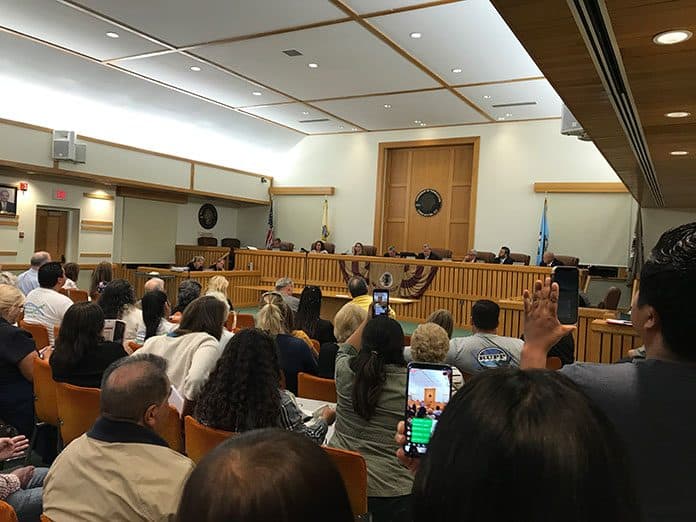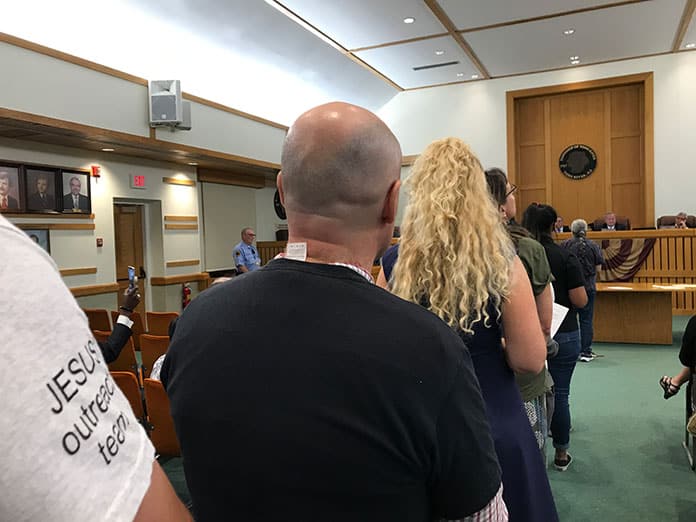
TOMS RIVER – A resolution opposing the state’s benefits given to undocumented residents became a political talking point at the most recent Township Council meeting.
New Jersey has provided help to undocumented: aid for attending college; granting driver’s licenses; and changing the way law enforcement deals with Immigration and Customs Enforcement. Republicans said that Democrats are turning New Jersey into a sanctuary for illegal immigrants.
The Ocean County Freeholders have filed a lawsuit against the state because they say the ICE issue interferes with local police. The state has said very clearly that law enforcement does not have to change what they are doing and that the lawsuit is unnecessary (see below).
Republican Councilmen Maurice “Mo” Hill, George Wittmann Jr., Brian Kubiel, and Daniel Rodrick ultimately voted to support this lawsuit, and oppose what they called sanctuary policies. Democrats on the council Terrence Turnbach and Laurie Huryk didn’t agree. Councilwoman Maria Maruca, a Republican, abstained because she works for the Motor Vehicle Commission and the resolution mentioned driver’s license requirements.
Most of the discussion centered around State Attorney General Gurbir Grewal’s Immigration Trust Directive, which tells law enforcement that they are not to do ICE’s job for them. The concern was that undocumented were not reporting crimes because they feared deportation.

“To me, that’s restricting local law enforcement,” Councilman Maurice Hill said. “You can’t pick and choose which laws you enforce.”
Turnbach, a lawyer, said the Immigrant Trust Directive has no legal impact on any local police. Supporting the Freeholder’s lawsuit to fight it will only divide a community.
A few speakers noted that former Ocean County Prosecutor Joseph Coronato, a Republican, even made a video to calm the fears of undocumented. It was partially in response to news that some undocumented were not seeking important medical help because they were afraid of being deported.
Members of the public had signs and chanted slogans. A number of times, Wittmann told them to stop shouting out. The majority of people who spoke were in favor of the Immigrant Trust Directive. They included religious and community leaders.
Connie Pascale, a long-time advocate for poor and underrepresented people, questioned why the council would pass a resolution that is divisive when for the last few months, everyone was talking about trying to unify the different cultures in town.
Ramu Dasgupta, who has also been a long-time advocate and now volunteers for CASA Freehold (an organization that gets immigrants to integrate and become productive community members) said “I see on a daily basis what happens when protections are removed.”
She told the story of a women who went to jail for her third violation of driving without a license. She was picked up by ICE in the jail.
“I have met women who have seen their husbands murdered in front of them,” she said. They come here for a better life and wait for years and sometimes decades to go through the lengthy process of becoming a citizen.
People depend on immigrants to do their work for them in restaurants, child care, and manual labor and then turn their backs on them when they need help, she said.
Former South Toms River Mayor Joseph Champagne, an attorney, said that the Immigration Trust Directive is asking for the relatively minor crime of illegal immigration to not be reported to the federal authorities so that immigrants feel safe reporting much more serious crimes to police.
An immigrant from Haiti, he asked why the word “sanctuary” now has such a negative connotation. At one point, America was founded by people seeking sanctuary from other nations.
“This is not a political issue. This is a human issue,” he said.
Geoff Ginter, a Pine Beach resident who often speaks at public hearings about regional issues, said that politicians shouldn’t be trying to make certain things harder for groups of people, but they should make everything easier for everyone. It should be easier for everyone to get driver’s licenses. It should be easier for everyone to go to college.
“If you want a more just society, stop punching down and start punching up,” he said.
State: No Lawsuit Needed
The State Attorney General’s office, when reached for comment by this newspaper, stated that there is nothing in the directive that says the county cannot continue working with ICE in the way that it has been.
“Nothing in the Directive restricts officers from complying with the requirements of
federal law, including 8 U.S.C. § 1373,” read a statement from Peter Aseltine, spokesman for the Attorney General’s office.
Currently, when an inmate is brought into the Ocean County Jail, they are interviewed about their country of origin and where they are born, a county representative said. If there are any red flags, Immigration and Customs Enforcement (ICE) is notified. It is then up to the discretion of ICE whether they want to interview the suspect about their residency status.
The State Attorney General issued the Immigration Trust Directive at the end of last year making it so that law enforcement agencies must not ask about residency status unless it is relevant to the crime being investigated.
The reason for this Directive is that, in order for police to do their jobs properly, they have to be trusted by the public. An undocumented immigrant who witnessed a crime or is the victim of a crime is less likely to report it to police if they fear deportation, according to the Attorney General’s office.

“This fear makes it more difficult for officers to solve crimes and bring suspects to justice, putting all New Jerseyans at risk,” Attorney General Gurbir Grewal wrote in the directive. “To be clear, nothing in this new Directive limits New Jersey law enforcement agencies or
officers from enforcing state law – and nothing in this Directive should be read to imply that
New Jersey provides “sanctuary” to those who commit crimes in this state. Any person who
violates New Jersey’s criminal laws can and will be held accountable for their actions, no matter their immigration status. Similarly, nothing in this Directive restricts New Jersey law enforcement agencies or officers from complying with the requirements of Federal law or valid court orders, including judicially-issued arrest warrants for individuals, regardless of immigration status.”
Basically, the directive states that local law enforcement shouldn’t be asking about residency or helping ICE just for the purposes of immigration enforcement. They must work with ICE, however, for violent or sexual crimes such as:
- Any first or second degree offense, as defined in N.J.S.A 2C:43-1;
- Any indictable domestic violence offense defined in N.J.S.A. 2C:25-19;
- A list of other crimes such as assault, endangering the welfare of children, burglary, witness tampering, eluding, stalking, and more.
The directive also states that law enforcement can no longer keep an office for ICE, and the county is complying with that, the county representative said. The ICE officer has worked remotely in the past, so there is really little difference.
The county will continue to operate as they have been until the lawsuit comes to fruition, he said. They will still question suspects about their nation of origin and report suspicions to ICE.






